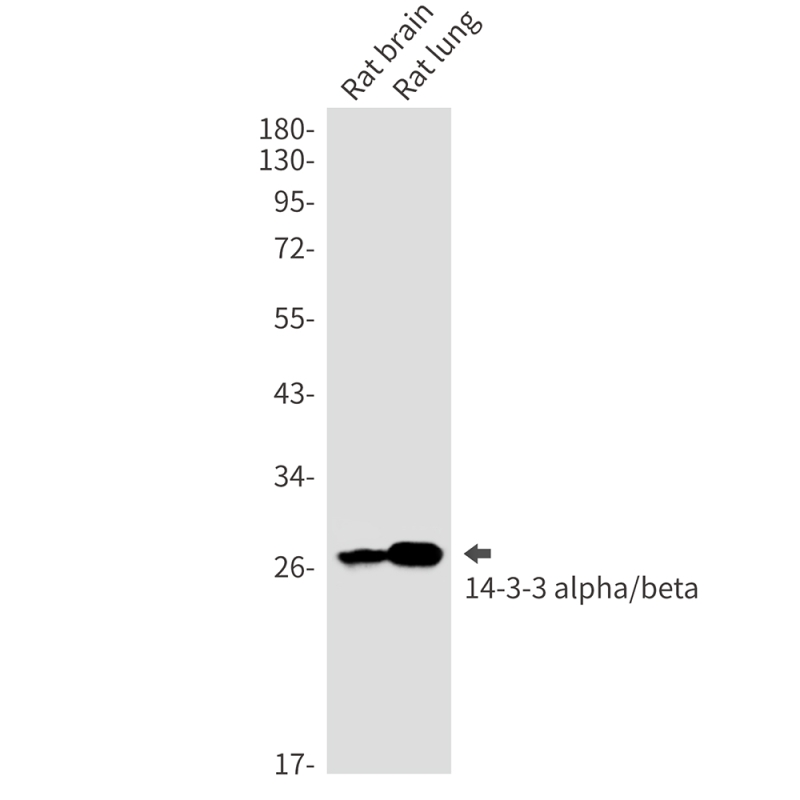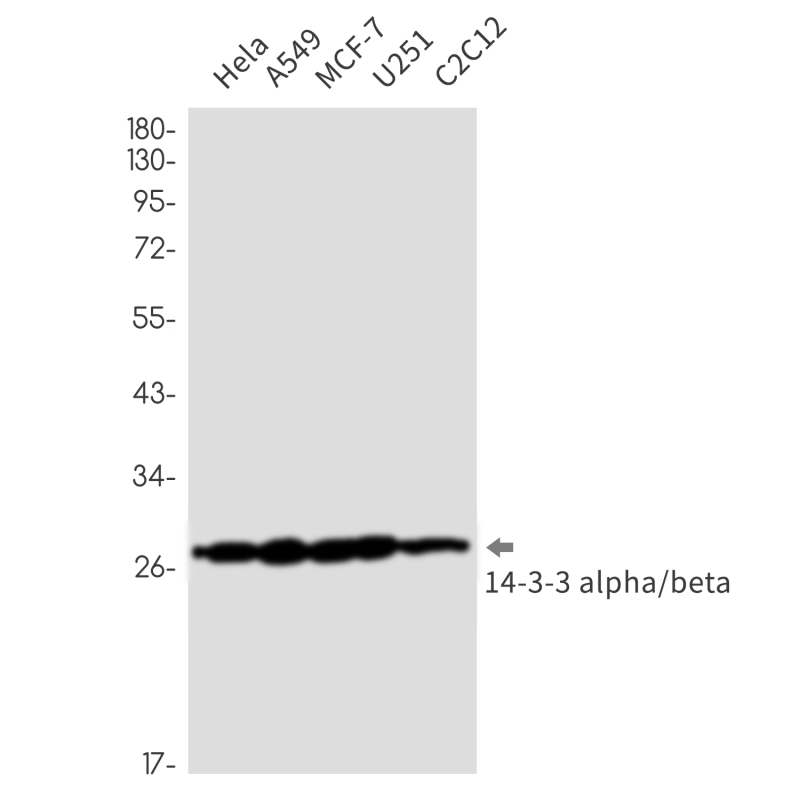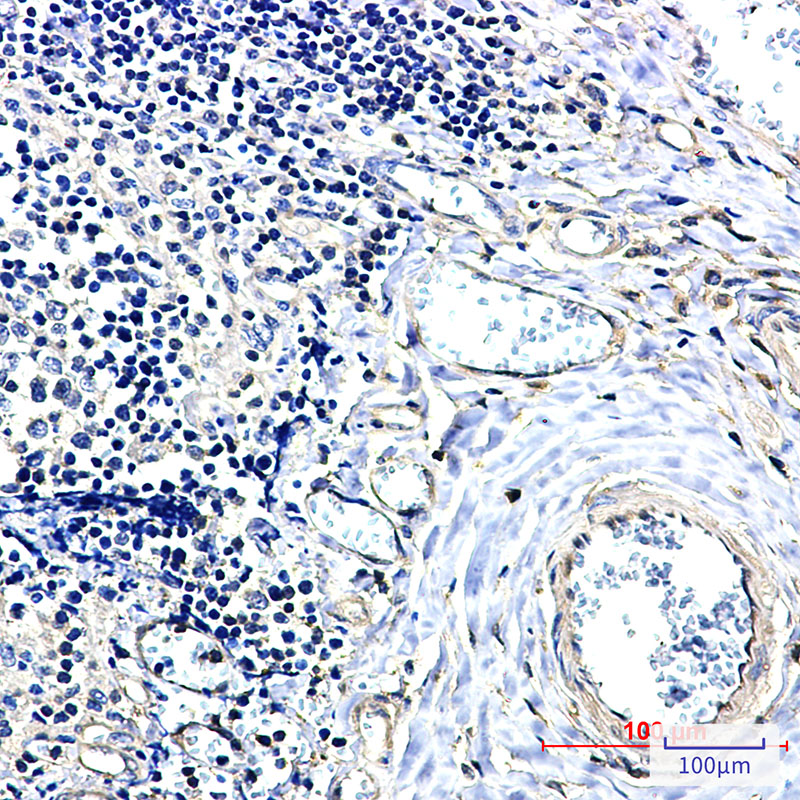


| WB | 1/500-1/1000 | Human,Mouse,Rat |
| IF | 1/20 | Human,Mouse,Rat |
| IHC | 1/50-1/100 | Human,Mouse,Rat |
| ICC | 技术咨询 | Human,Mouse,Rat |
| FCM | 咨询技术 | Human,Mouse,Rat |
| Elisa | 咨询技术 | Human,Mouse,Rat |
| Aliases | YWHAB; 14-3-3 protein beta/alpha; Protein 1054; Protein kinase C inhibitor protein 1; KCIP-1 |
| Entrez GeneID | 7529 |
| WB Predicted band size | Calculated MW: 28 kDa; Observed MW: 28 kDa |
| Host/Isotype | Rabbit IgG |
| Antibody Type | Primary antibody |
| Storage | Store at 4°C short term. Aliquot and store at -20°C long term. Avoid freeze/thaw cycles. |
| Species Reactivity | Human,Mouse,Rat |
| Immunogen | A synthetic peptide of human 14-3-3 alpha/beta |
| Formulation | Purified antibody in TBS with 0.05% sodium azide,0.05%BSA and 50% glycerol. |
+ +
以下是3篇关于14-3-3 alpha/beta抗体的代表性文献(简略版):
1. **文献名称**:*14-3-3 proteins: a family of versatile molecular regulators*
**作者**:Aitken A, et al.
**摘要**:综述14-3-3蛋白家族的结构与功能,指出alpha/beta亚型在细胞周期调控和凋亡中的作用,并提及特异性抗体在检测蛋白互作(如与p53、Raf激酶结合)中的应用。
2. **文献名称**:*Detection of 14-3-3 alpha/beta as a biomarker for neurodegenerative diseases using phospho-specific antibodies*
**作者**:Berg D, et al.
**摘要**:研究利用14-3-3 alpha/beta抗体检测脑脊液中的磷酸化蛋白水平,证实其在克雅氏病和阿尔茨海默病中的诊断价值,提示其作为神经退行性疾病的生物标志物潜力。
3. **文献名称**:*14-3-3 alpha/beta promotes TGF-β-induced epithelial-mesenchymal transition in cancer via stabilization of Smad4*
**作者**:Li Y, et al.
**摘要**:揭示14-3-3 alpha/beta通过结合并稳定Smad4蛋白,增强TGF-β信号通路,促进肿瘤细胞上皮间质转化(EMT),研究使用特异性抗体验证蛋白互作机制。
注:以上内容为示例性概括,实际文献需通过PubMed/Google Scholar检索关键词“14-3-3 alpha/beta antibody”或结合具体研究场景筛选。
The 14-3-3 alpha/beta antibody is a tool used to detect the 14-3-3 protein family members, which are highly conserved regulatory proteins expressed ubiquitously in eukaryotic cells. The 14-3-3 family comprises seven isoforms (α/β, γ, ε, η, σ, τ/θ, ζ) that function as adaptor proteins, modulating interactions between signaling molecules involved in cell cycle regulation, apoptosis, and stress responses. The alpha (α) and beta (β) isoforms, encoded by the YWHAQ and YWHAB genes, respectively, share ~85% sequence homology and often exhibit overlapping roles. These proteins bind to phosphorylated serine/threonine residues on target proteins, influencing their stability, localization, or activity.
14-3-3 alpha/beta antibodies are widely employed in research to study cellular pathways such as PI3K/AKT, MAPK, and p53 signaling. They are also used as diagnostic markers in neurological disorders; elevated 14-3-3 proteins in cerebrospinal fluid correlate with prion diseases like Creutzfeldt-Jakob disease. However, cross-reactivity between isoforms can complicate interpretation, necessitating validation via knockout controls or isoform-specific assays. Commercial antibodies are typically raised against conserved regions or isoform-unique epitopes, with applications spanning Western blot, immunohistochemistry, and immunoprecipitation. Dysregulation of 14-3-3 alpha/beta has been implicated in cancer, neurodegeneration, and metabolic disorders, underscoring their biological and clinical relevance.
×